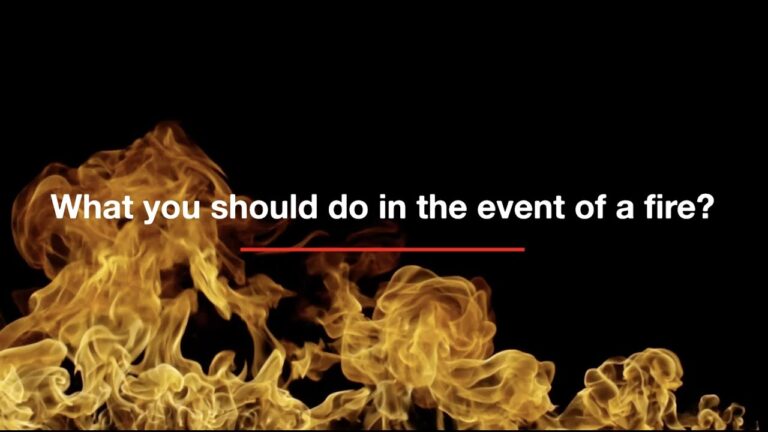Understanding what to do in the event of a fire is not just crucial knowledge but a potential life-saving skill. Fires are frightening and can spread rapidly, leaving little time to react. In such situations, being prepared and knowing the right steps to take can make all the difference in ensuring your safety and that of your loved ones. This comprehensive guide aims to equip you with the necessary information on what to do in the event of a fire. From immediate actions to long-term preventive measures, we will explore effective strategies to stay safe and minimize risks during a fire emergency. Let’s delve into the essential tips and guidelines to help you be better prepared and protected.
Understanding Fire Safety Basics
When it comes to fire safety, being prepared can make all the difference in an emergency. Knowing what you should do in the event of a fire is crucial to staying safe and protecting yourself and your loved ones. Fire safety basics are essential for everyone to understand and follow to prevent tragedies and minimize risks.
Importance of Smoke Alarms
Smoke alarms are your first line of defense against fire emergencies. Regularly test your smoke alarms to ensure they are in working condition. Install smoke alarms in every bedroom, outside each sleeping area, and on every level of your home for maximum protection.
Creating an Escape Plan
Developing a fire escape plan is crucial for every household. Make sure everyone in your family knows two ways to escape from each room in the house. Practice the escape plan with all family members at least twice a year to ensure everyone is prepared.

Creating a Fire Escape Plan
In the event of a fire, having a well-thought-out escape plan can mean the difference between life and death. It is crucial to create and practice a fire escape plan with all household members to ensure everyone knows what to do in case of an emergency.
Plan Routes and Safe Meeting Points
Identify multiple escape routes from each room in your home, as some may be blocked during a fire. Designate a safe meeting point outside, a safe distance from your home, to ensure everyone is out of danger.
Remember to practice your escape plan regularly to familiarize everyone with the routes.
Utilize Fire Safety Equipment
Install smoke alarms on every level of your home and inside sleeping areas. Test them monthly and replace batteries as needed. Consider adding a fire extinguisher in the kitchen and near potential fire hazards.
- Check the expiration date on your fire extinguisher annually.
- Keep hallways and entryways clear of clutter for easy escape.

Equipping Your Home with Fire Safety Tools
When it comes to fire safety, being prepared is crucial. Equipping your home with the right tools can make a significant difference in case of a fire emergency. Here are some essential fire safety tools to have in your home:
Smoke Alarms
Install smoke alarms in key areas of your home, including bedrooms and near the kitchen. Test them monthly to ensure they are in working condition and replace batteries at least once a year.
Fire Extinguishers
Keep fire extinguishers in accessible areas on each level of your home. Make sure all family members know how to operate them in case of an emergency.

Practicing Fire Safety Drills
Regularly conducting fire safety drills is essential to ensure everyone knows what to do in case of a fire emergency. These drills help in preparing individuals to act swiftly and responsibly under stressful situations. It is crucial to practice these drills at homes, schools, and workplaces to enhance fire safety awareness.
Importance of Fire Safety Drills
Fire safety drills assist in familiarizing individuals with evacuation routes, gathering points, and proper usage of fire extinguishers. Being prepared can save lives during a fire incident. Through practice, people can react quickly and minimize panic in real emergencies.
Steps to Conduct Fire Drills
1. Inform participants about the upcoming fire drill, including the date and time.
2. Create a scenario simulating a fire emergency to make the drill more impactful.
3. Use alarm systems to simulate fire alarms and prompt everyone to follow evacuation protocols.
4. Evaluate the drill’s effectiveness by assessing response times and identifying areas for improvement.
What to Do During a Fire Emergency
During a fire emergency, it’s crucial to stay calm and act quickly to ensure your safety and the safety of those around you. Remember, what should you do in the event of a fire is important information that can save lives.
1. Stay Low and Crawl to Safety
If there is smoke, stay low to the ground where the air is clearer. Crawl to the nearest exit avoiding inhaling smoke or hot air. Protect your face with a cloth to avoid smoke inhalation.
2. Feel the Door Before Opening
Before opening any doors, feel the doorknob and the door itself. If it is hot, do not open it as there may be fire on the other side. Use an alternative exit if possible. Check for heat using the back of your hand to avoid burns.
Preventing Fires in the Home
Fires in the home can be devastating, but there are proactive steps you can take to minimize the risk of a fire breaking out.
Regularly Check Smoke Alarms
Ensure your smoke alarms are working correctly by testing them monthly. Change the batteries at least once a year to guarantee they are always in optimal condition.
Maintain Electrical Appliances
Inspect electrical outlets, cords, and appliances for any signs of wear or damage. Replace frayed wires and avoid overloading outlets to prevent electrical fires.
- Unplug appliances when not in use
- Do not run extension cords under rugs
- Check for recalls on electrical devices
Use Caution in the Kitchen
Most home fires start in the kitchen. Never leave cooking unattended and keep flammable items away from the stovetop.
Frequently Asked Questions
-
- What are the basic steps to take in the event of a fire?
- The basic steps to take in the event of a fire include staying calm, alerting others, evacuating the building, calling emergency services, and following designated evacuation routes.
-
- How can I prepare for a fire emergency?
- To prepare for a fire emergency, you should create a fire escape plan, regularly test smoke alarms, keep fire extinguishers handy, and ensure everyone in your household or workplace is aware of the emergency procedures.
-
- Should I try to fight the fire on my own?
- It is not advisable to try to fight a fire on your own unless you have been trained to do so and the fire is very small. In most cases, it is safer to evacuate the building and let professional firefighters handle the situation.
-
- What should I do if I am unable to evacuate due to smoke or fire?
- If you are unable to evacuate due to smoke or fire blocking your exit route, you should stay low to the ground, cover your mouth with a cloth, and try to signal your location to rescuers. If possible, find a room with a window to await rescue.
-
- How can I help prevent fires in the first place?
- To help prevent fires, you should never leave cooking unattended, avoid overloading electrical outlets, keep flammable items away from heat sources, and maintain your home or building’s fire safety systems.
Final Thoughts: Staying Safe in the Event of a Fire
When faced with a fire emergency, knowing what to do can save lives. From the importance of having an evacuation plan to staying low in smoke-filled areas, every action counts. Remember to remain calm, alert authorities immediately, and help others evacuate safely. Regularly check and maintain fire safety equipment to ensure they function properly when needed. By being proactive and informed, you can minimize risks and increase your chances of staying safe in the event of a fire. Always prioritize safety and preparedness to protect yourself and your loved ones.



